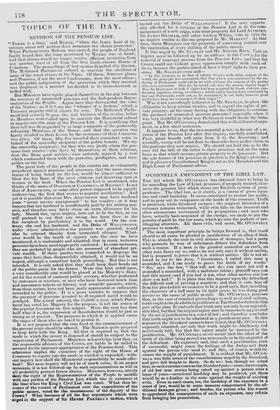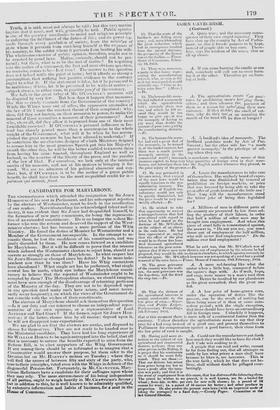O'CONNELL'S AMENDMENT OF THE LIBEL LAW.
THE bill which Mr. O'CONNELL has obtained leave to bring in for amending the Law of Libel, promises, if properly treated, to re-
move the greatest blot which stains our English system of juris- prudence. The libel law, as it stands, is a source of gross injus- tice and cruel hardship. It seems calculated to protect the guilty, and to pour out its vengeance on the heads of the innocent. Truth is punished, while falsehood escapes ; the original fabricator of a calumny remains unharmed, while ruin falls on the innocent and often unconscious instrument of its propagation ; and men who
have, actually been acquitted of the charge, are made to pay the penalty of guilt by the law-costs, which go into the pockets of pet- tifogging attornies. All these evils, and more, Mr. 0.CoarNELe proposes to remedy. The most important principle be brings forward is, that truth should in all cases be pleaded in justification of an alleged libel.
This is already the case in civil actions of damages; but a party who proceeds by way of indictment debars the defendant from such a course. If a man is the greatest scoundrel on earth, no other man dares say so, unless he not only says it without malice,
but is prepared to prove that it is without malice. He is not al- lowed to say to the Jury, " Gentlemen, I called this man a scoundrel, and I am ready to prove the truth of my words." " No," says the law, " that will not do ; you must not call a scoundrel a scoundrel, with a malicious intent; plaintiff says you had this intent ; and if you had it not, what other motive can you show you had ?" It is plain that this imposes upon the defendant the difficult task of proving a negative; and that it cuts him off from the plea (which we conceive to be a good one), that, in calling the character of a bad man by its right name, he was doing good service to the cause of public morals. Mr. O'CONNELL proposes that, in the ease of criminal proceedings as well as of civil actions, truth ought to be pleadable in justification. TheStandard attack s this part of the plan. It contends that truth may not only be an unjustifi- able libel, but that the original injury may be immensely aggravated by the act of j usti fication in a court of law ; and therefore concludes that truth ought not to he admitted as a justificatory plea. In this argument the Standard seems to have forgot, that Mr. O'Coseveee expressly admitted, not only that truth might he libellously and maliciously told, but that the injury might be increased by the justification. Mr. O'CONNELL never meant that the effect of the truth of the libel being proved was necessarily to be the acquittal of the defendant. He expressly said, that such a justification, even if successful, might rouse the feelings of the Judge and Jury against the person who used it; and this, of course, would in- crease the weight of punishment. It is evident that Mr. O'CON- NELL was fully aware of the considerations urged by the Standard, and gave full weight to them. So do we: but, though we admit that, in such extreme cases as the Standard puts—cases, for example, of old but true stories being raked up against a person after a lapse of years—occasional hardship may be produced, yet these would be as a feather in the scale against the weight of existing evils. Even in such cases, too, the hardship of the exposure in a court of law, would be in some measure compensated by the ad- ditional damages given ; and besides, the person who has reason to apprehend the consequences of such an exposure, may refrain from bringing his prosecution.
11•111r
Truth, it is said, must not o/ways be told; but this very maxim implies that it must, and will, generally be told. Public opinion is one of the greatest auxiliaries to moral and religious principle in enforcing the fulfilment of the duties of life ; and its power t. tends 'through every gradation of society, from the minister of stile whom it prevents from enriching himself at the ex;•ense of his country, to the cobler whom it prevents ffout beatillg his wife. The wholesome exercise of public opinion, therefore, ought not to be crushed by penal laws. Malice, certainly, should not be pro- tected ; but then, what is to be the test of malice? In inquiring into the malice of' a statement, the first and most obvious qucstion, we conceive, comes to be—Is it true ? The answer to this question does not indeed settle the point at issue ; but it affords so strong a presumption, that nothing but positive. evidence to the contrary ought to rebut it. If the statement is false, let it be peesuued to be malicious ; if true, let it be presumed to be without malice ;— subject always, in either case, to positive proqf of the contrary. We believe the great value of Mr. O'CONNELL'S measure will be disputed by very feW, But how does it happen that measures like this so rarely e:lianate from the Government of the country ? While the Whis.s were out of office, the oppressive anomalies of the law of lib I were the constant theme of their complaint: why, then, did they not hasten, on their accession to power, to make the removal of those anomalies a measure of their government? And why, above all, did they allow it to proceed from one of their most formidable enemies? If O'CoNNELL'S personal influence in Ire- land has already proved more than a counterpoise to the whole weight of the Government, what will it be when he has accom- plished the great measure be has been allowed to undertake? If be entertains the mischievous designs of which Ministers deigned to accuse him in the most gracious Speech put into his Majesty's mouth the other day, he will be the better enabled to execute them from having his namt toasted, throughout England as well as Ireland, as the assertor of the liberty of the press, and the purifier of the law of libel. For ourselves, we look only at the intrinsic merits of his measure, and not at his motives in Winging it for- ward. We are no admirers of his political character and con- duct; but, if O'CONNELL is to be the author of a great public benefit, he shall have from us the most unqualified credit for it- palmam fled meruit, fowl.





















 Previous page
Previous page